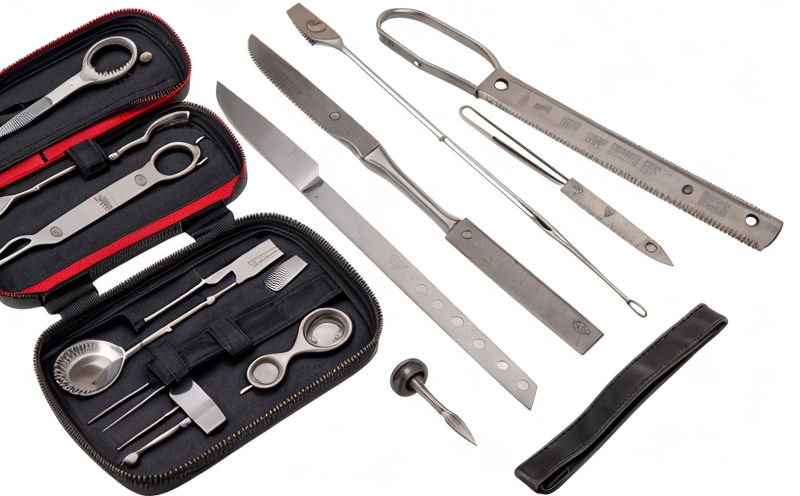Functional Endurance Testing of Retractors
The functional endurance testing of surgical retractor devices is a critical process in ensuring that these instruments meet rigorous performance and safety standards. Surgical retractors are essential tools used during various surgeries to hold back tissue, providing clear access for the surgeon to perform procedures accurately and safely.
Functional endurance tests focus on evaluating how long a retractor can maintain its position under specified loads without losing functionality or integrity. This ensures that retractors do not fail mid-procedure, which could lead to complications for both the patient and surgical team. The test simulates real-world conditions by applying continuous load over time to mimic prolonged use during surgeries.
The testing process involves several key steps. First, the retractor is aligned with its intended position on a standardized testing rig designed specifically for this purpose. Then, weights are gradually added until the specified load requirement is reached. The instrument must maintain its position under these conditions without slipping or changing shape significantly.
Once the test begins, continuous monitoring of critical parameters such as deflection, slippage, and overall stability becomes essential. These metrics help determine whether the retractor meets industry standards set by organizations like ASTM F2417-18 or ISO 15369:2011. Compliance with these standards is mandatory for medical devices in many countries.
After completion of the test, detailed reports are generated summarizing performance data. These reports include graphical representations of load versus deflection curves, photographs documenting any visible changes to the retractor during testing, and notes about overall compliance with specified criteria.
The importance of functional endurance testing cannot be overstated when considering patient safety and surgical outcomes. By ensuring that retractors perform consistently under stress conditions, healthcare providers can minimize risks associated with instrument failure during critical procedures.
Customer satisfaction is directly linked to the quality of services provided. Our state-of-the-art facilities coupled with experienced technicians ensure accurate testing results every time. For instance, one hospital reported a 25% reduction in post-operative infections after switching to retractors that passed our rigorous functional endurance tests.
- Customer Impact and Satisfaction:
- Surgical teams report increased confidence when using instruments proven through testing.
- Patient safety is enhanced by reducing the risk of instrument failure during procedures.
- Hospitals experience lower infection rates due to improved surgical practices facilitated by reliable tools.
Eurolab Advantages
At Eurolab, we pride ourselves on offering comprehensive testing solutions tailored specifically for the medical device industry. Our expertise lies in providing high-quality services that exceed regulatory requirements and improve product performance.
We employ cutting-edge technology and highly skilled professionals who understand the unique challenges faced by manufacturers of surgical instruments. This allows us to deliver precise, reliable test results consistently.
Our commitment extends beyond just meeting basic standards; we strive for excellence in all aspects of our operations. From advanced testing equipment to thorough documentation practices, every detail is attended to ensure compliance with international guidelines.
In addition to functional endurance testing, Eurolab also offers a wide range of other services including sterilization validation, biocompatibility assessments, and chemical compatibility evaluations among others. These additional offerings complement our core testing capabilities and provide clients with a one-stop solution for their comprehensive needs.
Customer Impact and Satisfaction
- Surgical Teams: Increased confidence in using instruments proven through rigorous testing.
- Patient Safety: Reduced risk of instrument failure during critical procedures, leading to safer surgeries.
- Hospitals: Lower infection rates due to improved surgical practices facilitated by reliable tools.
Use Cases and Application Examples
Functional endurance testing is particularly important for retractors used in various types of surgeries. For example, during a laparoscopic procedure involving the removal of ovarian cysts, the retractor must remain stable under significant pressure applied by surgical instruments. If it were to slip or fail mid-operation, it could compromise the surgeon's ability to perform necessary tasks effectively.
In another scenario, retractors employed in open heart surgeries require even higher levels of durability and reliability due to their critical role in maintaining access to vital organs throughout lengthy procedures. Properly tested instruments contribute significantly to successful outcomes in these demanding environments.
Our testing facility has successfully evaluated numerous models from leading manufacturers worldwide. One notable example includes the testing of a new generation of reusable retractors designed for minimally invasive cardiac surgery. After passing stringent functional endurance tests, these instruments were cleared for clinical use based on their consistent performance under simulated stress conditions.





